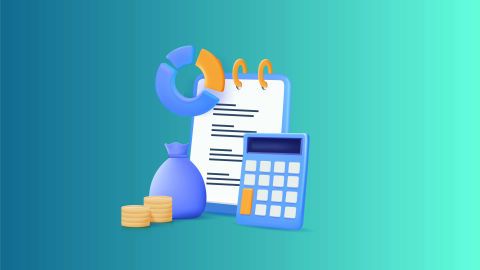Taking aLoan Against PropertyfromBajaj Financecan be a smart way to access funds for major investments or debt consolidation, all while maintaining your financial stability. By including such products in a well-rounded financial plan, individuals can make the most of their resources and confidently work towards achieving their financial goals.
What is an EC (Encumbrance) card?
AnEncumbrance Certificate (EC)is an official document issued by the government that proves whether a property is free from any encumbrances or legal claims. This certificate is issued by the sub-registrar office of the area where the property is located.The term "encumbrance" refers to any claim or liability, such as a mortgage, lien, or legal dispute, that affects the property’s ownership. When you apply for anEncumbrance Certificate, it confirms that the property has no outstanding loans or legal issues attached to it.
For example, if you are purchasing property or planning to take aloan against property, the EC will verify that the property is legally clear of any mortgages, so the lender can safely offer a loan based on that property. Without an EC, a potential buyer or lender may not be willing to proceed, as it could lead to legal complications later.
Importance of an EC card in property transactions
TheEncumbrance Certificate (EC)is important for both buyers and sellers in property transactions. Here’s why:Clear title verification: When you buy a property, you want to be sure that the seller has the right to sell the property. The EC verifies that the property does not have any outstanding mortgages or legal disputes, ensuring the buyer receives a clear title to the property.
Securing loans against property: If you are looking to take aloan against property, having an EC card is essential. Banks and financial institutions require this document to ensure that the property is free from encumbrances. If the property is already mortgaged, the bank will not approve the loan until the existing mortgage is cleared.
Avoiding future legal issues: The EC helps avoid future problems, such as unexpected claims on the property by lenders or other parties. Without an EC, you could end up in a legal dispute over ownership or unpaid debts tied to the property.
Ensuring the property’s value: A property with no encumbrances holds more value, as it is considered legally sound and free of complications. The EC card is proof that the property is a good investment.
How to apply for an EC card?
To apply for anEncumbrance Certificate, follow these simple steps:Visit the local sub-registrar office: You need to visit the office where the property is registered. This is usually the sub-registrar office in the area where the property is located.
Fill out the application form: You’ll need to fill out an application form for the EC card. This form can be obtained from the sub-registrar office or online, depending on your location.
Provide property details: The application will require specific details about the property, such as its registration number, survey number, and address.
Pay the fee: There is a nominal fee for applying for an EC card, which varies depending on the location.
Submit the application: Once you’ve completed the form and paid the fee, submit the application. The office will process your request and issue the certificate.
Steps to check EC card status online
In many places, you can check the status of your EC card application online. Here are the steps to do so:Visit the official website: Go to the official website of your state’s land registration department or sub-registrar office.
Navigate to the EC section: Look for the section related toEncumbrance Certificatesoronline services.
Enter the details: You will need to enter details like your application number, property details, and other requested information.
Check the status: After entering the information, you will be able to view the status of your EC card application (whether it is under process or ready to be collected).
Contact the office: If the online portal doesn’t show your EC status, you can always visit the sub-registrar office or call them for updates.
Documents required to obtain an EC card
When applying for an EC card, you will need to provide some basic documents. Here is a table that lists the common documents required:| Document | Purpose |
| Proof of identity | To confirm your identity (e.g., Aadhar card, passport, voter ID) |
| Proof of ownership of the property | To show that you own the property (e.g., sale deed or property registration document) |
| Property details | Information like survey number, plot number, and address of the property |
| Fee payment receipt | Proof of payment for the application fee |
How to download EC card online?
In some states, you can download yourEC online. To do so, follow these steps:Log in to the official portal: Visit the state’s official land records website.
Go to the EC section: Find the section dedicated to theEncumbrance Certificate.
Enter your details: Fill in the required details about the property and your application.
Download the EC: Once your application is approved, you will be able to download the EC card directly from the website.
For more details, checkEC onlinefor your specific region.
Common issues when applying for EC card
Here are some common issues you might face when applying for an EC card:Incomplete or incorrect details: If you provide incorrect details about the property, your application may be rejected or delayed.
Outstanding payments: If there are any unpaid dues on the property (like unpaid registration fees or taxes), the issuance of the EC might be delayed.
Technical errors: Sometimes, the online application system may experience technical issues, making it difficult to submit or check the status of your application.
Ownership disputes: If there are disputes regarding the ownership of the property, obtaining the EC may take longer.
Benefits of obtaining an EC card
TheEncumbrance Certificateoffers several key benefits:Peace of mind: Knowing that the property is free of legal issues provides peace of mind, whether you are buying a new home or taking out aloan against property.
Clear property titles: It ensures that the property title is clear, which is essential when dealing with financial institutions or legal authorities.
Loan eligibility: Without an EC, it can be difficult to get a loan against property, as lenders want to make sure the property is free of encumbrances.




